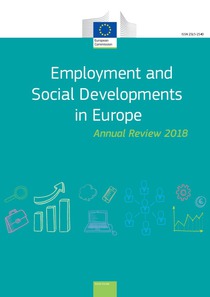Employment and social developments in Europe 2018
"In a context of a shrinking working-age population in the EU, technological innovations that increase productivity become ever more crucial, but they also change the organization of production of goods and services and the world of work. Automation entails capital deepening, especially in the...
| Institution: | ETUI-European Trade Union Institute |
|---|---|
| Format: | TEXT |
| Language: | English |
| Published: |
Luxembourg
2018
Publications Office of the European Union |
| Subjects: | |
| Online Access: | https://www.labourline.org/KENTIKA-19301172124911293549-employment-and-social-developm.htm |
| _version_ | 1771659899357364225 |
|---|---|
| collection | Library items |
| description | "In a context of a shrinking working-age population in the EU, technological innovations that increase productivity become ever more crucial, but they also change the organization of production of goods and services and the world of work. Automation entails capital deepening, especially in the manufacturing sector and for low-skill tasks and routine activities. Other innovative technologies enable the emergence of new non-standard forms of work which allow more flexible re-organization of working time and space. Both capital deepening and new forms of work raise concerns about a possible decrease in standard, socially insured full-time employment, about potential job losses and decreasing job quality. Income inequalities and the gender pay gap are impacted as well and could amplify due to these trends. Atypical work also challenges the organization and financing of social protection mechanisms and the traditional way of representing worker and employer interests in the context of social dialogue.
However, the changing relationship between labour and capital brings about many new opportunities: innovative technologies increase productivity, create new jobs, facilitate inclusiveness on the labour market, and allow for a better work-life balance. Investments in education and the promotion of skills are key to reaping the benefits and lowering the risks from technological developments. As human and physical capital are complementary, policies which leverage the strong inter-generational effect of individuals' socio-economic background on their skills and labour market performance are of critical importance. Also, traditional distinctions made by the social protection systems need to be rethought in order to provide inclusive protection. Social partners are adapting to the developments in the labour market and could play a positive role in adjusting the existing legal framework to the new forms of work, including by managing the increased flexibility of working time and space in atypical work. The European Pillar of Social Rights provides a useful framework for adapting labour market and social systems to the new world of work to the benefit of the entire EU population." |
| format | TEXT |
| geographic | EU countries |
| id | 19301172124911293549_3fbd70556f98467783a1d46b63d4cab8 |
| institution | ETUI-European Trade Union Institute |
| is_hierarchy_id | 19301172124911293549_3fbd70556f98467783a1d46b63d4cab8 |
| is_hierarchy_title | Employment and social developments in Europe 2018 |
| language | English |
| physical | 280 p. Digital |
| publishDate | 2018 |
| publisher | Luxembourg Publications Office of the European Union |
| spellingShingle | arrangement of working time economic and social development economic growth economic recession employment EMU gender globalization information technology labour market moonlighting refugee social dialogue social protection social partners digitalisation wages working poor income distribution equal employment opportunity comparison Employment and social developments in Europe 2018 |
| thumbnail | https://www.labourline.org/Image_prev.jpg?Archive=134507995278 |
| title | Employment and social developments in Europe 2018 |
| topic | arrangement of working time economic and social development economic growth economic recession employment EMU gender globalization information technology labour market moonlighting refugee social dialogue social protection social partners digitalisation wages working poor income distribution equal employment opportunity comparison |
| url | https://www.labourline.org/KENTIKA-19301172124911293549-employment-and-social-developm.htm |

